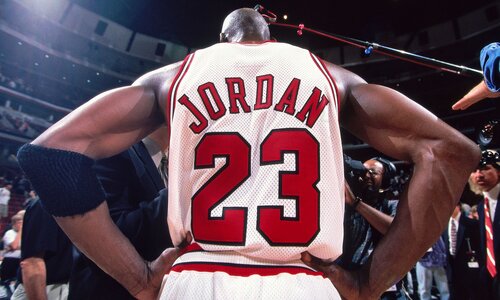Unraveling the Mysteries: Michael Jordan's Alleged Connection to Gambling
 By
By
Michael Jordan's career, characterized by
remarkable achievements and records, was periodically punctuated by episodes
that transcended the boundaries of the sport, none more so than his first
retirement in 1993. This period in Jordan's life was fraught with speculation
and controversy, notably linked to his gambling habits, casting a long shadow
over his otherwise stellar career. Despite these challenges, Jordan's impact on
the NBA was profound, earning him six NBA Finals Most Valuable Player (MVP) Awards
and securing his status as the league's best player with five regular-season
MVP Awards. His record-setting ten scoring titles underscored his offensive
prowess, while his defensive skills were equally lauded, reflected in his nine
All-Defensive First Team honors.
Jordan's influence extended beyond his
statistical achievements, playing a crucial role in popularizing the NBA across
the globe during the 1980s and 1990s. His magnetic persona and competitive
spirit captivated fans worldwide, contributing significantly to the league's
international expansion and the sport's global appeal.
The Chicago Bulls' dominance under his
leadership, highlighted by two three-peats in the '90s, cemented the team's
legacy and set new standards for success and excellence in professional
basketball. Jordan's contributions to the game were recognized with his
induction into the Basketball Hall of Fame, further solidifying his position as
a cultural icon and arguably the greatest basketball player ever. Jordan's ascendancy in the '80s to the
zenith of basketball lore was punctuated by his competitive zeal, not just in
basketball but in all facets of life, including gambling. His gambling exploits
were well-documented, extending beyond the basketball court to golf courses and
other arenas.
This aspect of his life came under intense
scrutiny when Richard Esquinas, in his book "Michael and Me: Our Gambling
Addiction — My Cry for Help," claimed Jordan owed him substantial sums
from gambling.
In this context, the
recent legalization of sports betting in North Carolina, effective
from March 11th, represents a full-circle moment that connects the past with
the present. As fans prepare to legally place their bets on NBA games, they
engage in a facet of sports culture that has always been intertwined with its
history, albeit now within a regulated framework. The period leading up to Michael Jordan's
first retirement from basketball was thick with controversy and speculation,
deeply entangled with his well-documented gambling habits. An incident that
brought this issue to the forefront involved a $57,000 check Jordan wrote to
James "Slim" Bouler, a convicted drug dealer, ostensibly to cover
gambling debts from golf games, a fact Jordan confirmed under oath after
initially describing the payment as a loan.
This and other incidents, such as Jordan's
$1.25 million golf debt to San Diego businessman Richard Equinas, raised
significant questions about the extent of Jordan's gambling and its potential
impact on his illustrious NBA career.
Amidst this backdrop of personal challenges
and public scrutiny, speculation swirled that Jordan's 1993 retirement was not
merely a personal decision but possibly a covert suspension by the NBA aimed at
mitigating any damage his gambling controversies could inflict on his image and
the league's reputation. While this theory has been widely debated and remains
part of the lore surrounding one of the NBA's greatest legends, both the league
and Jordan have denied these claims.
In explaining his decision, Jordan cited a
"competition problem" rather than a gambling issue, underscoring his
well-known penchant for wagering on everything from golf to games of chance
with teammates and security guards. Despite the controversy, investigations
into Jordan's gambling found no evidence of betting on basketball games. Amid these controversies, the tragic murder
of Jordan's father in July 1993 added a deeply personal dimension to his
decision to retire. The loss was profound, with Jordan citing his father's
death as a significant factor in his decision to step away from basketball.
The intertwining of personal grief with the
public spectacle of his gambling controversies created a complex backdrop for
his retirement announcement. Despite the conspiracy theories suggesting
a secret suspension, Jordan and NBA officials have vehemently denied these
claims. In the documentary The Last Dance, Jordan emphasized that his
retirement was a personal choice, driven by the need for a break and to cope
with his father's passing, rather than any enforced absence from the league.
NBA officials, including then-Commissioner David Stern, also refuted the notion
of a gambling-related suspension, labeling such rumors as baseless. Although shrouded in mystery and
speculation, Jordan's first retirement did little to diminish his legacy.
Instead, it added another layer to the legend of a man whose life and career
were as complex as they were remarkable. His return to the NBA in 1995 and
subsequent achievements only enhanced his status as one of the greatest
athletes ever. In analyzing Jordan's first retirement, it
becomes evident that the intertwining of personal trials, public scrutiny, and
professional achievements crafted a narrative rich in complexity and intrigue.
The speculation surrounding his gambling
habits and the tragic loss of his father provide a poignant glimpse into the
pressures and challenges faced by one of basketball's most iconic figures.
Despite the controversies, Jordan's legacy remains untarnished, a testament to
his unparalleled skill, indomitable spirit, and the profound impact he had on
the world of sports.
The Prelude to Retirement
Controversy and
Speculation
The Catalyst of Personal
Loss
Debunking the Myths
Legacy and Return
Final Thoughts






